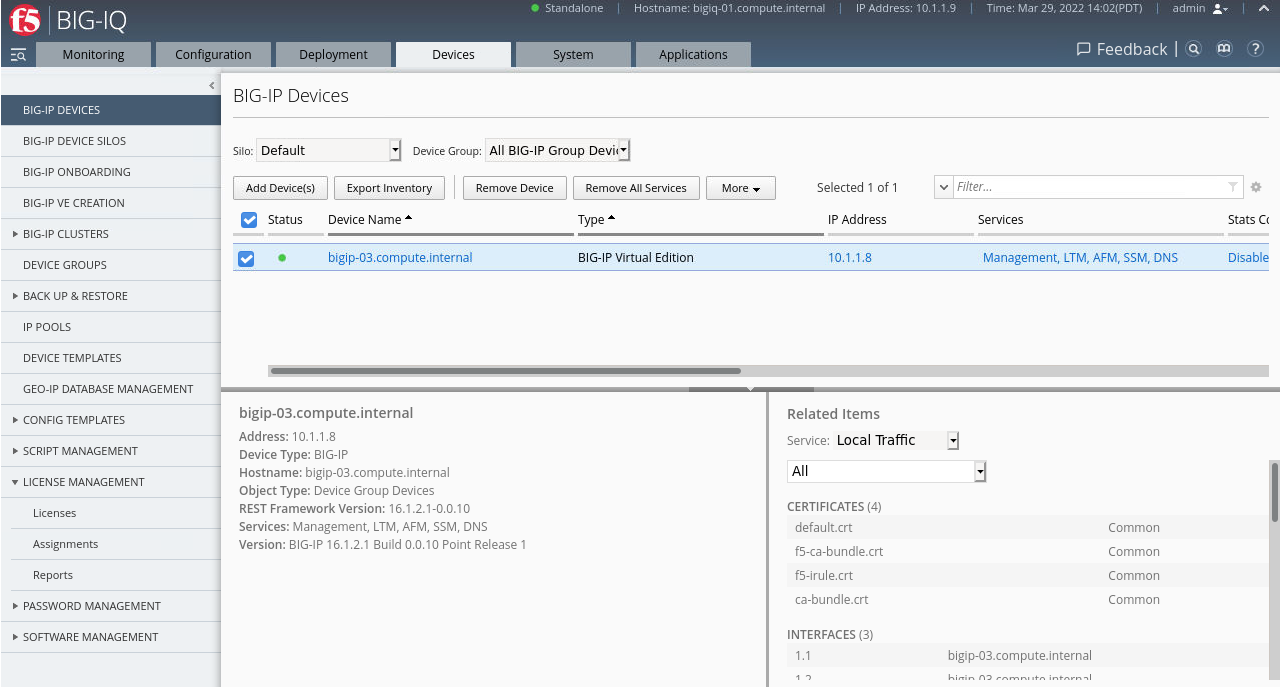Automation, Orchestration & DevOps > Class 2: A&O Toolchain 211: BIG-IP Deployments with Declarative Onboarding (DO) > Module 1: Programmability - Introduction to F5 Declarative Onboarding Concepts Source | Edit on
Lab 3 Onboard a BIG-IP via BIG-IQ¶
In the previous labs, we pushed the declaration directly to BIG-IP. In this lab, we are going to send our JSON declaration to BIG-IQ, which will configure the BIG-IP. Additionally, the device will be onboarded and managed by BIG-IQ.
Review the declaration for BIG-IP-03, and notice the following changes:
- Updated license class
- New statements to target the BIG-IQ
Just as before we will use VSCode to send the declaration. This time we will send the declaration to BIG-IQ and BIG-IQ will onboard the BIG-IP.
- Use the copy button in the upper right hand corner of the declaration below
- Paste the declaration into the VSCode editor
Attention
Be sure to connect to the BIG-IQ device in VSCode before sending the declaration.
{ "class": "DO", "declaration": { "schemaVersion": "1.5.0", "class": "Device", "async": true, "Common": { "class": "Tenant", "myLicense": { "class": "License", "licensePool": "lab-licenses", "licenseType": "licensePool", "bigIpUsername": "admin", "bigIpPassword": "@gi1ity2022" }, "myProvisioning": { "class": "Provision", "ltm": "nominal", "gtm": "minimum", "afm": "minimum" }, "myDns": { "class": "DNS", "nameServers": [ "8.8.8.8", "2001:4860:4860::8844" ], "search": [ "f5.com" ] }, "myNtp": { "class": "NTP", "servers": [ "0.pool.ntp.org", "1.pool.ntp.org", "2.pool.ntp.org" ], "timezone": "UTC" }, "external": { "class": "VLAN", "interfaces": [ { "name": "1.1", "tagged": false } ] }, "internal": { "class": "VLAN", "interfaces": [ { "name": "1.2", "tagged": false } ] }, "external-fl": { "vlan": "external", "class": "SelfIp", "address": "10.1.10.240/24", "trafficGroup": "traffic-group-1" }, "internal-fl": { "vlan": "internal", "class": "SelfIp", "address": "10.1.20.240/24", "trafficGroup": "traffic-group-1" }, "external-self": { "vlan": "external", "class": "SelfIp", "address": "10.1.10.241/24", "allowService": "none" }, "internal-self": { "vlan": "internal", "class": "SelfIp", "address": "10.1.20.241/24" }, "defualt": { "gw": "10.1.10.1", "class": "Route" }, "myConfigSync": { "class": "ConfigSync", "configsyncIp": "10.1.20.241" }, "myFailoverUnicast": { "class": "FailoverUnicast", "address": "10.1.20.241" }, "hostname": "bigip-03.compute.internal" } }, "targetUsername": "admin", "targetHost": "10.1.1.8", "targetPort": 443, "targetPassphrase": "@gi1ity2022", "bigIqSettings": { "statsConfig": { "enabled": true }, "useBigiqSync": true, "conflictPolicy": "USE_BIGIQ", "deviceConflictPolicy": "USE_BIGIP", "failImportOnConflict": false, "versionedConflictPolicy": "KEEP_VERSION" } }
Once the declaration completes, login to BIG-IQ-01.
Note
URL: https://10.1.1.9Username: adminPassword: @gi1ity2022Attention
When onboarding BIG-IP-03 via BIG-IQ-01 the DO post may take a few minutes to complete. Be sure wait until the declaration result window appears in VSCode with the success message before proceeding.
Attention
When the declaration is complete you may notice that BIG-IQ is still adding the device. This is expected as BIG-IQ will perform the device onboarding first. Afterwards, it will proceed to add the device and discover services on the BIG-IP.
Navigate to the devices tab and then click on BIG-IP devices.
- Notice that the BIG-IP device has been added to BIG-IQ

Login into BIG-IP-03 and review the configurations.
Note
URL: https://10.1.1.8Username: adminPassword: @gi1ity2022